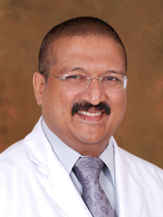Namaskar! I am Dr. Sonny Jacob and I've been with ATLAS since early 2009.
Cardiology is a challenging field. Time is crucial. I have realized that the difference between life and death could very well be less than a few seconds. Making a decision and perfect execution is paramount. But although challenging, my profession can also be extremely rewarding. I proudly remember the first time I cardioverted a patient back to life, well guided by a senior staff nurse. During my nearly two decades as a doctor, I can remember several successful operations. One incident stands out among all others.
A patient arrived at the coronary care unit unconscious and with a critical heart failure. As a team we quickly began resuscitation. He was on the verge of death. We continued revival attempts tirelessly for 45 minutes but there was no response from the now virtually lifeless body. Brain death and permanent death start to occur in just 4 to 6 minutes after someone experiences cardiac arrest. A victim's chances of survival are reduced by 7 to 10 percent with every minute that passes in that condition. Unlike what you may see on TV, very few attempts at resuscitation succeed after 10 minutes. We had tried for 45 minutes! We were planning to give up and declare the patient dead. But our senior staff, a nun, requested me to continue resuscitation procedures for a few more minutes and I complied. What happened next I can only describe as a miracle. His heart rhythm slowly stabilized and gradually returned to normal. He was alive again! We were all still worried though, he had been 'gone' a long time and the tissues of his brain and heart could have suffered irreversible damage leading to debilitating conditions. But once again he astonished us. After 10 days, the man who had literally tasted death calmly walked out of the hospital on his own, with minimal abnormalities. God's grace, teamwork and dedication saved the man's life. I am humbled by this overwhelming experience to this day.
At ATLAS, although I cannot promise any miracles, I can promise you can expect whole hearted commitment, coordinated teamwork and great optimism and compassion every day for every patient.
The good news is that many forms of heart disease can be prevented or treated with diet and exercise. I look forward to meeting with you and discussing these healthy lifestyle choices during your health checkup!
A little more about me
Education: I have had the privilege of working with several well known physicians as well as eminent cardiologists, many of them pioneers in their subspecialties and experts in their fields. A few note-worthy names include:
Dr. C. K. Eapen, an expert on haemodialysis and treatment for snake bites, Dr. P. D. Mitra, a skilled Internal Medicine professor, Dr. Mariamma Kuriakose, a specialist on Leptospirosis, Dr. Eapen Punnose, Dr. K. N. Reddy, a pioneer in Interventional Cardiology, Dr. P. P. Mohanan and Professor Sudhaya Kumar, expert cardiologists, Dr. R. Krishnakumar, an authority in pediatric cardiology, Dr. Roney Mathew, Dr. J. Jacob ,Dr. Sajy Kuruttukulam, Dr. Manu Varma, and Professor Tharakan, my well respected teacher at Sreechitra and a very positive influence.
I still clearly remember their good advice which has served me well during my career. "Don't think you've done a superior job when you successfully perform a primary angioplasty in a patient with cardio-genic shock. A general practitioner who treats a patient with severe dehydration is just the same". In both instances what is important is managing the emergency situation and saving the life of the patient, not the complexity or difficulty of the operation.
It is also important to know that in our line of work, everything doesn't always go smoothly. Another advice was "You should take the same precautions and give equal importance when you do the first or the ten thousandth angiogram". I remember once I had just completed an angiogram in one of my patients via a radial route and cleared him for angioplasty. After putting in the arterial and venous lines the patient suddenly developed severe chest pain followed by features suggestive of extensive myocardial infarction, i.e., a heart attack. He soon developed cardiac arrest. Immediately, my mentor, Dr. Sajy, rushed in and did a check angiogram which revealed a spasm of all the three vessels due to an unknown cause. In the meantime, I intubated the patient, putting a tube into his air passage to facilitate artificial respiration, and our team started other resuscitation methods. Finally at the end of an hour, we got the patient back and he underwent successful angioplasty. In these situations it is imperative to have a cool head and the backup of a great team.
Affiliations: I stay current in my field by being actively involved in professional medical associations outside of work such as the Interventional Cardiology Council of Kerala and the Cardiology Society of India (CSI). At CSI, I have served as a part of their Executive Committee and during this tenure I was enthusiastically involved in various activities such as conducting preventive cardiology clinics and public awareness programs and was one of the investigators for a study on "Acute Coronary Syndrome Registry". I have also co-authored two articles along with Dr. Harikrishnan that were published in the Indian Heart Journal.
Education
Bachelor of Medicine and Bachelor of Surgery (MBBS) – Trivandrum Medical College
Specialization
Doctor of Medicine (MD) in Internal Medicine – B.J. Medical College, Pune
Doctor of Medicine (DM) in Cardiology – Sreechitra Institute of Medical Science and Technology, Trivandrum
Affiliations
Cardiology Society of India
Interventional Cardiology Council of Kerala










